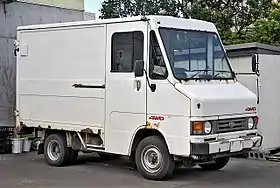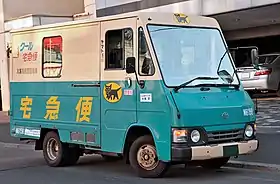Toyota QuickDelivery
The Toyota QuickDelivery is a step van that shares a platform with the Dyna, the ToyoAce, and the HiAce.[1] The QuickDelivery was introduced in 1982, and allows passengers to walk from the drivers seat to the rear of the vehicle standing upright. The powertrain comes as a rear wheel drive or four wheel drive. It is capable of a 2-ton payload starting with the second generation produced from 1986 to 1999. Later a revised version appeared badged the Urban Supporter. It was requested by Yamato Transport, who said, "I want a car with a high ceiling that does not require me to bend down even when working in the car."

First Generation (100)
| Toyota Quick Delivery 100 | |
|---|---|
 Toyota Quick Delivery 100 4WD | |
| Overview | |
| Manufacturer | Toyota |
| Production | 1982 - 1985 |
| Body and chassis | |
| Class | Van |
| Body style | Step van |
| Layout | All-wheel drive |
| Powertrain | |
| Engine | 2,985 cc 5L[2] |
| Transmission | 5-speed gearbox |
| Dimensions | |
| Wheelbase | 2300 mm |
| Length | 4475 mm |
| Width | 1690 mm |
| Height | 2525 |
| Curb weight | 1760 kg |
| Chronology | |
| Predecessor | Toyota Dyna (U10), Toyota ToyoAce (4th gen), Toyota HiAce (H11/H20/H30/H40) |
| Successor | Toyota Quick Delivery 200 |
The 100 model series began in the second quarter of 1982. The truck allowed a maximum load of 1.25 tons. The First Generation Quick Delivery was only available with permanent all-wheel drive. The vehicle was powered by a 3-liter Hino engine.
Second Generation (200)
| Toyota Quick Delivery 200 | |
|---|---|
 | |
| Overview | |
| Manufacturer | Toyota |
| Production | 1986 - 2000 |
| Body and chassis | |
| Class | Van |
| Body style | Step van |
| Layout | Rear-wheel drive |
| Powertrain | |
| Engine | 2.4 L (2.8 L starting in 1995) |
| Transmission | 5-speed gearbox |
| Dimensions | |
| Wheelbase | 2500 mm |
| Length | 5020 mm |
| Width | 1790 mm |
| Height | 2610 mm |
| Curb weight | 2190 kg |
| Chronology | |
| Predecessor | Toyota Quick Delivery 100 |
| Successor | Toyota Urban Supporter |
The Quick Delivery 200 was released in January 1986. With the new version, a total load of up to two tons could now be transported. A Toyota B engine with a displacement of 3.0 liters and a Toyota 3B engine with a displacement of 3.4 liters were available. Due to new emission regulations in 1994, the engines had to be adapted accordingly. At the same time, the interior was also revised and refreshed with new style elements. For the first time in 1999, the name has now been abbreviated as QD. For the QD200, Toyota uses a 4B engine (diesel engine) with a displacement of 3.7 liters. The QD200 is currently classified as a low-emission vehicle by the Japanese ministries, giving customers tax breaks. Appropriate approval was given by the Ministry of Land and Economy, which awarded the QD200 the environmental prize. In 2000 Toyota added an LPG variant with a 2.7 liter 3RZ engine to an engine range. However, the diesel has so far remained the more popular version with customers.[3][4]
Third generation
| Toyota Urban Supporter | |
|---|---|
 | |
| Overview | |
| Manufacturer | Toyota |
| Production | 2001 - present |
| Body and chassis | |
| Class | Van |
| Body style | Step van |
| Layout | All-wheel drive |
| Powertrain | |
| Engine | 2.8 L |
| Dimensions | |
| Wheelbase | 2300 mm |
| Length | 4640 mm |
| Width | 1785 mm |
| Height | 2650 mm |
| Curb weight | 2080 kg[5] |
| Chronology | |
| Predecessor | Toyota Quick Delivery 200 |
The new Quick Delivery was shown in January 2001, under the name Urban Supporter. The Y200 was designed for a maximum payload of 1.25 tons. Toyota used its own 5L engine for the drive.
References
- "QuickDelivery" (in Japanese). Japan: Toyota. Retrieved 2017-10-11.
- "Quick Delivery 100 (Hiace / Toyoace)".
- "Quick Delivery 200 (Dyna / Toyoace)".
- "Quick Delivery 200".
- "Urban Supporter (Dyna / Toyoace)".